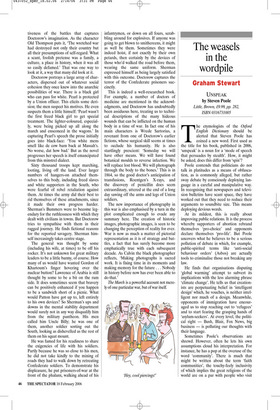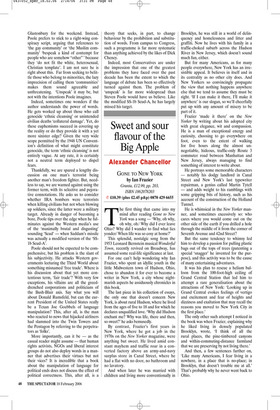The weasels in the wordpile
Graham Stewart
UNSPEAK by Steven Poole Little, Brown, £9.99, pp. 282, ISBN 0316731005 The etymologists of the Oxford English Dictionary should be alerted that Steven Poole has coined a new word. First used as the title for his book, published in 2006, ‘unspeak’ is a noun for a ‘mode of speech that persuades by stealth’. How, it might be asked, does this differ from ‘spin’?
Poole contends that politicians do not talk in platitudes as a means of obfuscation, as is commonly alleged, but rather sway debate by consciously deploying language in a careful and manipulative way. In recognising that newspapers and television bulletins have scant space, they have worked out that they need to reduce their arguments to soundbite size. This means deploying devious words.
At its mildest, this is really about improving public relations. It is the process whereby supporters of abortion rebrand themselves ‘pro-choice’ and opponents declare themselves ‘pro-life’. But Poole uncovers what he believes to be a serious pollution of debate in which, for example, public-spirited terms like ‘anti-social behaviour orders’ (Asbos) are actually tools to criminalise those not breaking any law.
He finds that organisations disputing ‘global warming’ attempt to subvert its implications with the less alarming phrase ‘climate change’. He tells us that creationists are perpetuating belief in ‘intelligent design’ which, he vouches, is neither intelligent nor much of a design. Meanwhile, opponents of immigration have encouraged us to stop reaching out to ‘refugees’ and to start fearing the grasping hands of ‘asylum-seekers’. At every level, the political right — Bush, Blair, Fox News, big business — is polluting our thoughts with their language.
Sometimes Poole’s observations are shrewd. However, often he lets his own assumptions cloud his interpretation. For instance, he has a pop at the overuse of the word ‘community’. There is much that might be written about the term ‘faith communities’, the touchy-feely inclusivity of which implies the great religions of the world are on a par with people who visit Glastonbury for the weekend. Instead, Poole prefers to stick to a right-wing conspiracy script, arguing that references to ‘the gay community’ or ‘the Muslim community’ ‘bespeak a kind of contempt for people who are somehow “other” ’ because they ‘do not fit the white, heterosexual, Christian template’. I am not sure he is right about this. Far from seeking to belittle those who belong to minorities, the lazy imprecision of calling them ‘communities’ makes them sound agreeable and unthreatening. ‘Unspeak’ it may be, but not with the intentions Poole imagines.
Indeed, sometimes one wonders if the author understands the power of words. He gets worked up about those who call genocide ‘ethnic cleansing’ or unintended civilian deaths ‘collateral damage’. Yet, do these euphemisms succeed in covering up the reality or do they provide it with a yet more sinister edge? Given the very wide scope permitted by the 1948 UN Convention’s definition of what might constitute genocide, the term ‘ethnic cleansing’ is not entirely vague. At any rate, it is certainly not a neutral term deployed to dispel fears.
Thankfully, we are spared a lengthy discussion on one man’s terrorist being another man’s freedom fighter. But, needless to say, we are warned against using the former term, with its selective and pejorative connotations. He asks us to consider whether IRA bombers were terrorists when killing civilians but not when blowing up soldiers, since the latter were a military target. Already in danger of becoming a bore, Poole tips over the edge when he fulminates against the Western media’s use of the ‘maximally brutal and disgusting’ sounding ‘Scud’ — when Saddam’s missile was actually a modified version of the ‘SS1b Scud-A’.
Poole should not be expected to be comprehensive, but his problem is the slant of his subjectivity. He attacks Western governments lecturing the Third World about something misnamed ‘free trade’. Where is his discussion about that yet more contentious term, ‘fair trade’? With very few exceptions, his villains are all the greeddrenched corporations and politicians of the Bush-Blair axis. Say what you will about Donald Rumsfeld, but can the current President of the United States really be a Texan Joe Goebbels of language manipulation? This, after all, is the man who reacted to news that hijacked airliners had slammed into the Twin Towers and the Pentagon by referring to the perpetrators as ‘folks’.
More importantly, can it be — as the casual reader might assume — that human rights activists, NGOs and liberal interest groups do not also deploy words in a manner that advertises their virtues but not their vices? It is incredible that a book about the manipulation of language for political ends does not discuss the effect of political correctness. This, after all, is a theory that seeks, in part, to change behaviour by the prohibition and substitution of words. From campus to Congress, such a programme is far more systematic than anything achieved by the likes of Dick Cheney.
Indeed, most Conservatives are under the impression that one of the greatest problems they have faced over the past decade has been the extent to which the language of debate has been so effectively turned against them. The problem of ‘unspeak’ is far more widespread than Steven Poole would have us believe. Like the modified SS-1b Scud-A, he has largely missed his target.



















































































 Previous page
Previous page